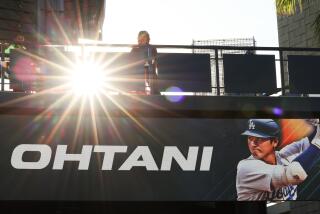South Korea-Japan rivalry shows no sign of cooling
- Share via
SAN DIEGO — Nam Hyung Kim wants to make one thing clear from the start. “We don’t hate Japan,” the South Korean journalist insists.
But just the fact Kim feels the need to clarify that point suggests that, well, maybe there is more to the two countries’ baseball rivalry than just baseball.
Not that the games haven’t been compelling.
Last summer South Korea had to get by Japan twice to win its first Olympic baseball gold. Three years before that Japan handed South Korea its only loss in the first World Baseball Classic en route to the tournament title.
And now the rivalry is coming to Los Angeles, home to the largest Korean and one of the largest Japanese communities in the U.S.
The teams have already met four times in this month’s second WBC, with Japan winning the most recent matchup, 6-2, Thursday to claim a No. 1 seeding for this weekend’s semifinals at Dodger Stadium.
If both teams win -- South Korea against Venezuela on Saturday and Japan over the U.S. on Sunday -- they will meet again in Monday’s championship game.
But should that happen, a baseball title will be only part of what’s at stake.
“Because of history,” says Kim, a baseball writer with SportsChosun of Seoul, “there’s bad memories.”
That will happen when one country invades, then annexes, another, as Japan did to Korea, leaving only when expelled after World War II. Even now the suspicions and distrust run deep, leaving the nations as reluctant allies. But if the bad blood started with history, it also has become territorial and cultural. And the baseball field has not been immune to those tensions.
“It goes back to our history and tradition,” agreed former Dodgers pitcher Jae Seo, who planted a South Korean flag on the mound at Angel Stadium after his country beat Japan in the quarterfinal round of the 2006 WBC, a ritual the Koreans repeated -- much to Japan’s anger -- after beating Japan again this week.
“It stems from our parents’ generation and us,” Seo said. “I’m sure that our next generation probably will feel the same.”
Yet nobody in the baseball world really noticed the rivalry until South Korea suddenly shot to international prominence in the sport by beating Japan to win the bronze medal in the 2000 Sydney Olympics.
Second-place finishes in the 2002 Intercontinental Cup and 2005 World Cup followed. And after South Korea rolled through the Beijing Olympic tournament unbeaten last summer -- upending Japan twice to send their rivals home without a medal for just the second time in Olympic history -- the International Baseball Federation ranked its national program as the second-best in the world, behind only Cuba.
Which, of course, made it the best program in Asia, all the Koreans -- and the Japanese -- really cared about.
As sports rivalries go, however, this is much less Red Sox-Yankees or Lakers-Celtics than it is a Cold War-style showdown between the Russian and U.S. hockey teams.
“Japan was always better than Korea,” said Acey Kohrogi, director of Asian operations for the Dodgers. “And then it became where Korea’s been dominating.”
Lately it has become ugly too, with some Japanese making statements that suggest the Koreans have outscored, outhit and outslugged the small-ball Japanese because of genetics as much as talent.
“They have big bodies,” Japanese outfielder Ichiro Suzuki, said through an interpreter. “They play closer to American-style baseball than Japanese baseball.”
In Japan, where ethnic purity has traditionally been revered, such comments smack of racism and ignore the fact that many of the country’s best players were -- and still are -- ethnic Koreans.
Masaichi Kaneda, for example, Japan’s only 400-game winner, and Isao Harimoto, the only player to get 3,000 hits, were both born to parents who were ethnic Koreans and are permanent residents of Japan but not Japanese nationals.
“Everyone knows that these top guys are all of Korean descent,” says Kohrogi, who believes the taboo over discussing that topic has faded a bit as some Koreans in the sports and entertainment fields have acknowledged their heritage in Japan, where Koreans make up the largest ethnic minority group. “They’re more open about it,” Kohrogi says.
Perhaps even philosophical.
Ichiro, the Seattle Mariners’ star who once called a loss to South Korea “the most humiliating day of my career” and said his goal was to prove that Korea won’t be able to beat Japan “in the next 30 years.” He now appears resigned to the fact the two countries, in baseball at least, might as well propose a peace.
“There is a destiny,” he said through an interpreter. “It’s like a girl you said goodbye to, and then you bump into the same girl again on the street so many times because there’s a destiny to meet again.
“Might as well get married if we are going to meet this frequently.”
--
More to Read
Go beyond the scoreboard
Get the latest on L.A.'s teams in the daily Sports Report newsletter.
You may occasionally receive promotional content from the Los Angeles Times.











